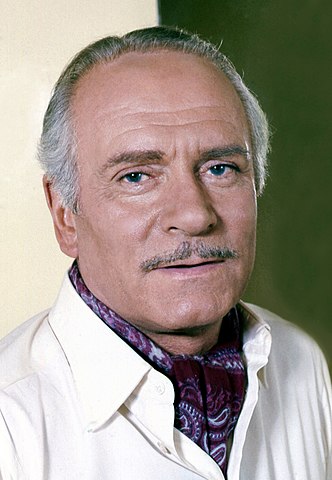Laurence Olivier Bio Height Weight Spouse
Laurence Kerr Olivier was born in Dorking, Surrey, England, on May 22, 1907, was an English actor. Young Laurence Olivier began his professional acting career on stage. He made his big screen debut in comedy crime film Too Many Crooks (1930) in role as The Man. He got his television debut in ITV Play of the Week series John Gabriel Borkman (1958) in role as John Gabriel Borkman. Laurence breakthrough performance came as Victor Prynne in a play "Private Lives" (1930). He landed his Broadway debut in a play "Murder on the Second Floor" (1929) in role as Hugh Bromilow, at Eltinge 42nd Street Theatre. He made his directorial debut with epic film Henry V (1944), also starred as King Henry V of England.
Height, Weight, Vital and Body Stats
Laurence Olivier height was 5' 10" іn fееt аnd іnсhеѕ or 178 іn cеntіmеtrеѕ, his weight was 160 іn pоunds or 73 іn kіlоgrаmѕ.
Birth Date:
May 22, 1907
Died:
July 11, 1989
Nationality:
United Kingdom
Sun Sign:
Gemini
Natural hair color:
Dark Brown
Eye Color:
Gray / Blue
Height:
5 ft 10 in | 178 cm
Weight:
73 kg | 160 lbs
Shoe Size:
Not Available
Best Movies
He was nominated for the Academy Awards for Best Actor for Wuthering Heights (1939) as Heathcliff, Rebecca (1940) as Maxim de Winter, The Entertainer (1960) as Archie Rice, Othello (1965) as Othello, and The Boys from Brazil (1978) as Ezra Lieberman.
He directed and starred as Richard III in drama film Richard III (1955), for which he won the BAFTA Award for Best Actor in a Leading Role.
He was nominated for the Academy Award for Best Actor and the Golden Globe Award for Best Actor – Motion Picture Drama for his role as Andrew Wyke in mystery thriller film Sleuth (1972).
He was nominated for the Academy Award for Best Supporting Actor and the Golden Globe Award for Best Supporting Actor – Motion Picture for his role as Dr Christian Szell aka "The White Angel" in thriller movie Marathon Man (1976).
He directed and starred as King Henry V of England in epic film Henry V (1944), for which was nominated for the Academy Awards for Best Actor and for Best Picture.
He directed and starred as Hamlet in drama movie Hamlet (1948), for which he was nominated for the Academy Awards for Best Director and for Best Picture also won the BAFTA Award for Best Film and the Golden Globe Award for Best Actor – Motion Picture Drama.
He directed and starred as Charles, the Prince Regent in romantic comedy film The Prince and the Showgirl (1957), for which was nominated for the BAFTA Award for Best Actor in a Leading Role.
He was nominated for the BAFTA Awards for Best Actor in a Leading Role for The Devil's Disciple (1959) as General John Burgoyne, Term of Trial (1963) as Graham Weir, and Carrie (1952) as George Hurstwood.
He won the BAFTA Award for Best Actor in a Supporting Role for his role as Field Marshal Sir John French in comedy musical war film Oh! What a Lovely War (1969).
He directed and starred as Dr Astrov in film version of National Theatre Company production Uncle Vanya (1963), for which was nominated for the Primetime Emmy Award for Outstanding Drama Series.
He won the Primetime Emmy Awards for Outstanding Lead Actor in a Limited or Anthology Series or Movie for The Moon and Sixpence (1959) as Charles Strickland, Long Day's Journey into Night (1973) as James Tyrone Sr., Love Among the Ruins (1975) as Sir Arthur Glanville-Jones, and King Lear (1983) as King Lear.
He was nominated for the British Academy Television Award for Best Actor for his role as Clifford Mortimer in drama film A Voyage Round My Father (1983).
He was nominated for the Golden Globe Award for Best Actor – Motion Picture Drama for his role as Marcus Licinius Crassus in epic historical drama film Spartacus (1960).
He was nominated for the Golden Globe Award for Best Supporting Actor – Motion Picture for his role as Julius Edmond Santorin in romantic comedy movie A Little Romance (1979).
Best TV Shows
He won the Primetime Emmy Award for Outstanding Supporting Actor in a Limited or Anthology Series or Movie for his role as Lord Marchmain in British television serial Brideshead Revisited (1982).
He was nominated for the Primetime Emmy Award for Outstanding Supporting Actor in a Limited or Anthology Series or Movie for his role as Harry Burrard ITV television miniseries Lost Empires (1986).
Facts
Attended the Central School of Speech and Drama in London, England.
Attended St. Edward's School, Oxford (1921-1924).
He was youngest of three children.
He was founding director of Britain's National Theatre (1963-1973).
He was nominated for the Tony Award for Best Actor in a Play for his role as Archie Rice in a play "The Entertainer" (1958), at Royale Theatre.
He won the Special Tony Award (1969), for distinguished achievement in theatre.
He was awarded a Star on the Hollywood Walk of Fame at 6319 Hollywood Boulevard in 1960.
He was awarded a Knight Bachelor in 1947.
The Laurence Olivier Awards was first established in 1976.
He last appeared on stage in Trevor Griffiths' play "The Party" (1973), at the National Theatre.
He published autobiography "Confessions of an Actor" in 1982.
Laurence died on July 11, 1989, Steyning, United Kingdom, at the age of 82.
Spouse
He was married to:
Joan Plowright (1961-1989) they had two daughters, Julie Kate Olivier, Tamsin Olivier and one son, Richard Olivier
Vivien Leigh (1940-1960)
Jill Esmond (1930-1940), they had a son, Tarquin Olivier
Relationships
He dated Sarah Miles (1960) and Danny Kaye (1949-1950).
